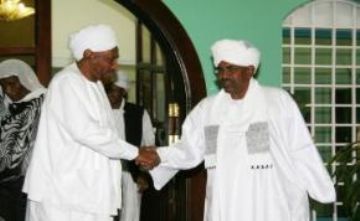Sudan’s NCP says still committed to dialogue with opposition party
13 February, 2011 (KHARTOUM) – The ruling National Congress Party (NCP) in north Sudan has renewed commitment to dialogue with the opposition National Umma Party (NUP), one day after the latter’s leader Al-Sadiq al-Mahdi denied reports of agreeing to join the government and reiterated demands for reforms.

“There are joint committees between us, therefore, we welcome continuation of this dialogue and expect to see its results” The NCP official said.
Sudan President Omar Al-Bashir offered to incorporate opposition parties into “a broad-base” government after it became clear that south Sudan was certainly going to secede from the north. But the opposition demands that the party dissolves the government and hold fresh elections.
The sudden meeting in January between the NUP leader Al-Mahdi and President Al-Bashir caused uproar within the opposition ranks and gave rise to speculations that Al-Mahdi was on his way to agreeing a power-sharing deal with the ruling party. Even some NUP members were outraged as they were pushing for confrontation with the NCP.
However, Al-Mahdi said that his talks with the NCP were over the “national agendas”, and categorically denied any intention to join the government.
“I don’t know what more can we do to prove that we are not after participation [in the government]? We are talking about the national agenda that everyone can be part of” Al-Mahdi told reporters on Saturday at a press conference.
“Please write in large font; the issue is not that we want ministries or prime minister. The issue is not who rules Sudan but how it is ruled,” he added.
The NUP leader stressed that his party wanted a new constitution, a brotherhood accord with the South, securing basic freedoms, resolving Darfur crisis, new economic policy, realistic handling of the standoff with the International Criminal Court (ICC) and a transitional government.
Sudan’s President Al-Bashir is under indictment by the ICC on charges of war crimes, crimes against humanity and genocide allegedly committed in the country’s western region of Darfur during a counterinsurgency campaign waged by the government after conflict with rebel groups erupted in 2003.
Political tension in north Sudan is growing as the country grapples with economic malaise manifested in shortage of foreign currency, rising food prices and soaring inflation.
The north stands to lose billions of dollars in oil revenues as a result of the secession of south Sudan, which produces nearly 75% of the country’s proven output of 500,000 barrels per day.
(ST)
